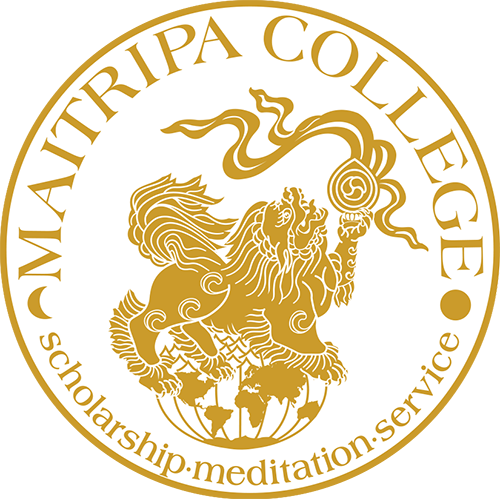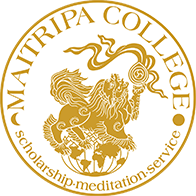Maitripa College’s rules of ethical conduct are designed to ensure that all members of the college’s community are capable of attaining the fulfillment of their educational objectives within an environment in which the physical, emotional, and spiritual health and security of each person is protected. Maitripa’s facilities are considered a sacred space, and all students are expected to conduct themselves with maturity and responsibility in that space, respecting the rights and property of others according to the principles of the Buddhadharma.
Rules of Ethical Conduct
Prohibitions ~ The following are strictly prohibited at Maitripa College:
Plagiarism
Plagiarism entails passing the work or information of others as if it were your own. Plagiarism is considered theft and will result in disciplinary action. Plagiarism includes taking information from sources that have been paraphrased, quoted, or summarized without giving credit to the original source. When writing an academic paper, all sources used must be listed with specific in-text citations, with the inclusion of full bibliographical details.
Dishonesty
Dishonesty refers to lying and/or supplying information that is knowingly false to school faculty or administrators. This includes misrepresentation of information or the intentional defamation of an individual within the school community.
Harassment
Maitripa College prohibits the harassment of any other member of our community. Harassment is the manifestation, be it written, verbal, emotional or physical, of statements of malicious intent directed toward any person in violation of our nondiscrimination policy and representing disregard for the ethical conduct outlined in the teachings of the Buddhadharma. Examples may include using inflammatory, violent or profane language; making jokes or using epithets about another person due to their origin, gender, sexual orientation or any other situation as expressed in our nondiscrimination policy; teasing or making practical jokes as expressed in our nondiscrimination policy; circulating or displaying degrading written material or pictures; or verbal abuse or insults of any kind.
Sexual Harassment
Examples of sexual harassment include:
- Making sexual advances
- Requesting sexual favors
- Any other physical or verbal conduct, of a sexual nature, made or threatened to be made, implicitly or explicitly, placing terms or conditions on the person’s education or employment
- Any conduct that may have as a purpose, or produce a result, of interfering with an individual’s professional or academic performance, or creating a sense of intimidation, hostility or offensive environment for the student or employee
Tampering
Tampering with or accessing without authorization official school records and interfering with faculty and staff in the performance of their official duties.
Stealing
Taking anything that has not been given, theft, acquiring without authorization, removing or inappropriately using property that belongs to the school or to others.
Disregard
Failure to respond to official school business or correspondence in a timely manner.
Disorderly Conduct
Engaging in disorderly conduct or in any action that may endanger the health or safety of any member of the Maitripa community. This includes endangering the wellbeing of the person that is performing the action.
Use of Intoxicants
The use, possession, and consumption of alcoholic beverages, drugs, and controlled substances within the premises of the school building and public areas are prohibited.
Smoking
Smoking in all campus areas is strictly prohibited.
Truancy and Tardiness
Absenteeism is not acceptable and all students are expected to be present at their classes and at community service hourly commitments. Written medical or verbal excuses for particular situations are required when the student is absent from a test, project, or community service commitment.
Recording and Copyrights
Students enrolled in a course may use personal recording equipment in class subject to the instructor’s approval. Personal recordings are not to be distributed to the public, and are to be used only by those enrolled in the class. All course lectures and original materials are copyrighted to Maitripa College and are not to be reproduced, copied, or published by any individual without express written permission from the professor and Maitripa College. Maitripa College archive recordings are currently not available for public use.
Grievances and Sanctions
Committee on Student Relations and Conduct
Engagement in any one of the prohibited activities by a student of Maitripa College while on school grounds will result in the student’s referral to the Committee on Student Relations and Conduct, and the imposition of disciplinary sanctions. These sanctions may include, but are not limited to, the following:
- Verbal or written warnings
- Disciplinary or academic probation
- Maitripa College reserves the right to immediately suspend a student, pending further action, who threatens the life or property of another person or school property or who behaves in a way that could be perceived as violent or potentially violent. Maitripa College also reserves the right to immediately and permanently suspend a student for a second violation of these guidelines.
Adjudication Process on Grievances and Sanctions (First Offense)
- Following a first offense incident, a Maitripa College Student Conduct/Incident Report will be filed with the Maitripa College Committee on Student Relations and Conduct by a staff member, faculty member, or student who witnessed or was involved in the incident
- Following the filing of the Conduct/Incident Report, one or more members of the Maitripa College Committee on Student Relations and Conduct and/or a staff member will meet with the student with the intent of collecting information about the student’s perspective on the events
- A follow-up report will be made in writing to the Maitripa College Committee on Student Relations and Conduct
- Within three weeks of the interview, the student will be presented by mail with a disciplinary notice that includes the following:
a) An objective description of the specific behaviors that are being addressed
b) The section/s of the Student Handbook that were violated
c) A description of the expected behaviors and the specific consequences of not meeting those expectations.
d) An explanation of the period of probation that the student will be expected to adhere to and a clear definition of what activities they will be allowed or not allowed to participate in during their probation. Normally a first offense violation will not result in the suspension of any activities, or will only result in the suspension of activities that are directly related to the violation. This decision will be determined on a case-by-case basis by the Maitripa College Committee on Student Relations and Conduct.
e) An explanation that clearly states that the student is being observed during this time
f) A clear explanation of the consequences should the student incur another violation during this time
g) Signatures of the Maitripa College Committee on Student Relations and Conduct, and relevant staff members - The student will sign and date the document, and return it to the office. If the student does not return the document to the office within 2 weeks, the document will be considered null and void and the student will be considered suspended from participation in activities at Maitripa College.
- At the end of the probationary period, the Maitripa College Committee on Student Relations and Conduct will present a formal recommendation to end the probation, extend the probationary period, or announce the implementation of the consequences described in the original document.
- Decisions made by the Maitripa College Committee on Student Relations and Conduct are final.
Adjudication Process on Grievances and Sanctions (Second Offense)
If a student commits another reported offense during the time of probation, the Maitripa College Committee on Student Relations and Conduct will present that student with formal suspension from all Maitripa College activities for as long as they deem appropriate. This suspension may be permanent.



